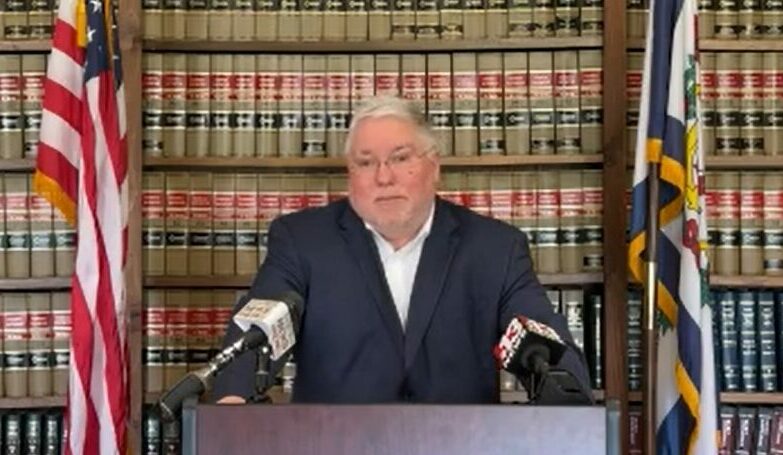Attorney General Patrick Morrisey is considering potential legal responses after a federal appeals panel concluded a state law can’t prevent a transgender girl who takes puberty blocking medication from participating in her school’s cross country and track teams.

“We’re analyzing it, but we will be challenging it,” said Morrisey, a Republican, speaking today on MetroNews’ “Talkline.”
The case was decided Tuesday by a three-judge panel of the Fourth Circuit Court of Appeals, which covers the area that includes West Virginia. In the majority were U.S. appeals judges Pamela Harris and Toby Heytens. Dissenting was their colleague, Steven Agee, who said the ruling went too far.
Lawyers for middle schooler Becky Pepper-Jackson — or B.P.J., as she is identified in court filings — challenged West Virginia’s law under Title IX policy and the Constitution’s Equal Protection Clause. She sought to participate in her middle school’s track and cross country teams.
“The question before us is whether the Act may lawfully be applied to prevent a 13-year-old transgender girl who takes puberty blocking medication and has publicly identified as a girl since the third grade from participating in her school’s cross country and track teams,” Judge Heytons wrote in the majority opinion. “We hold it cannot.”
The majority ruling, written by Heytens, was careful to define what it does not do.
“We do not hold that government officials are forbidden from creating separate sports teams for boys and girls or that they lack power to police the line drawn between those teams. We also do not hold that Title IX requires schools to allow every transgender girl to play on girls teams, regardless of whether they have gone through puberty and experienced elevated levels of circulating testosterone.”
Morrisey agreed the ruling does not invalidate West Virginia’s law. More narrowly, it’s a ruling that allows the plaintiff, Becky Pepper-Jackson, to participate in school athletics competition on the girls teams. However, Morrisey said there could be consequences beyond this particular case.
“It’s supposed to apply to the specific student. Obviously there will be a lot of people if they are similarly situated, they may cite that or decide to go to court,” Morrisey said. More broadly, he said, “the import of this is that this is a very significant setback for the law’s status.”
Morrisey alluded to appeals possibilities that include asking all of the judges of the Fourth Circuit to review the case — or petitioning for consideration by the U.S. Supreme Court.
“There are two options. You can go en banc to the whole Fourth Circuit where you get the whole sitting of the court or you can go right up to the U.S. Supreme Court. The Title IX question is teed up, and I think that if this goes up to the high court I am predicting you’re going to have a very different decision.”
In 2021, West Virginia joined dozens of states placing restrictions on transgender athletes’ participation on sports teams.
House Bill 3293 defines male and female “based solely on the individual’s reproductive biology and genetics at birth.” It says “any student aggrieved by a violation of this section may bring an action” against a county board of education or college “alleged to be responsible for the alleged violation” — intended to allow lawsuits over anyone contending a transgender athlete was gaining advantage in sports.

Becky Pepper-Jackson, according to filings in the case, was born male but identified as a girl from a very young age. By third grade, she was living as a girl at home and told her mother and father she did not want to keep going to school dressed as a boy.
More recently, she was diagnosed with gender dysphoria and had been receiving puberty-delaying treatment for almost a year when West Virginia passed the bill affecting transgender athletes.
Her federal lawsuit was aimed at being able to participate on the cross-country and track teams at Bridgeport Middle School.
The appeals panel took note of the many steps Pepper-Jackson had taken in her identification as a girl, including the use of puberty-blocking medication. By doing so, her body has not gone through the effects of puberty associated with increased strength and speed, the panel concluded.
“Because B.P.J. has never felt the effects of increased levels of circulating testosterone, the fact that those who do benefit from increased strength and speed provides no justification— much less a substantial one—for excluding B.P.J. from the girls cross country and track teams,” according to the majority opinion.
ACLU West Virginia, which provided legal support for Becky Pepper-Jackson, praised the appeals court ruling.
“We hope today’s ruling sends a message of hope to the trans youth of West Virginia,” said Aubrey Sparks, legal director of the ACLU of West Virginia, “and a message of warning to politicians who continue to dehumanize this vulnerable population.”
West Virginia is one of at least 24 states with a law on the books barring transgender women and girls from competing in certain women’s or girls sports competitions.
The bans are in effect in Alabama, Arkansas, Florida, Indiana, Iowa, Kansas, Kentucky, Louisiana, Mississippi, Missouri, Montana, North Carolina, North Dakota, Oklahoma, South Carolina, South Dakota, Tennessee, Texas and Wyoming.

